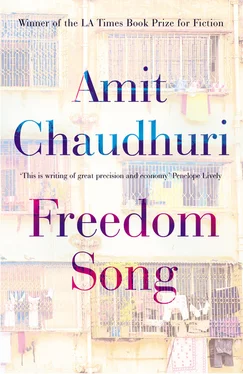The truth is, he was not used to being at home. And with Bablu away they were less like a couple than a pair of lodgers.
Then, gradually, the heap of newspapers by his side of the bed had grown, the small alley by the bed littered with papers, as if he were undertaking some sort of research. And his going to the toilet three times in the silence of the night, the sound of the flush nudging her deep in her sleep; she’d begun to worry whether there was anything wrong with his prostate. Any sign of abnormality made her worry and wonder, and this new silence outside and proximity within brought to her awareness what she probably hadn’t noticed before. She listened to him breathe at night. Many nights she spent not sleeping, but thinking and awake.
Once the curfew had ended he’d gone out into the world and bought oranges. But it had been a great blunder. On returning home, Khuku pointed out that they were, from the way they peeled and tasted, those terrible sour mutations that resembled oranges, kinoos. She derided him for his lack of discrimination. ‘What!’ Shib said. ‘But I told him I want oranges!’ Indignation, however, could not change the kinoos into oranges. Life had begun again.
And then there were only two days left for that performance.
‘No, it’s not a famous group; I’ve never heard of them before. But it’s a nice name. You feel you must have heard of them.’
‘That’s right.’
The two, aunt and niece, were desultorily discussing that frayed but bright entity, Bhaskar’s theatre troupe; for this late manifestation of the artistic bent was worth commenting on. Yet one of Khuku’s elder brothers, now dead, had written poetry, in rhyme and in blank verse, in twelve-line sonnets, in a marvellous phase between the age of eighteen and twenty, and had even had one poem published in Desh, and that copy had been circulated in at least five houses.
Another brother, Pulu, had done a stage adaptation of an unadaptable Sukumar Ray poem when he was a young man in Shillong, using all his four- and five-year-old nieces and nephews and his sisters-in-law in the cast (that was when Khuku was in London, rainswept and with six hours of sunlight, with Shib, who was still a student, and it had been described to her in a letter; and she’d known the strangeness of being in another country that she could not recognize if she looked out of the window and have the sense of her own country return to her from a description).
And it was now, a few days before this street-play, that it occurred to Khuku that her family had always been full of ne’er-do-wells, each one doing exactly what he pleased, and if Pulu hadn’t been brought to England in 1959 with Shib’s help he’d still be wheeling and dealing in secondhand cars in Shillong (which is what he’d been doing when he’d had that play enacted — a major success when her nephew and niece Moni and Beena — Borda’s children — and India itself had been ridiculously, helplessly young). These ne’er-do-wells were somehow provided for by Providence. And she thought of that family and realized that the bonds of relations surrounding it, radiating across and scattered through this city and elsewhere, was finally coming to an end, and she unexpectedly grew absorbed in its memories.
‘And they’re just a handful of boys,’ said Puti. ‘I wonder how Bhola mama copes with them.’
‘He’s indulgent — towards all his children, I’d say.’
‘But too much indulgence isn’t good, is it?’ said Puti, mother of a son, Mohit, who was so responsible at fourteen that he sometimes even gave advice to his parents.
At this moment, Bhaskar was witnessing the construction of a stage in a by-lane off Vidyasagar Road.
They’d arranged about seventy-five chairs, in rows.
Borda’s elder daughter in Golf Green was among those that had heard of the performance. She, Beena, lived with her parents, and went to work each morning with the air of one about to perform, once again, an indispensable task. The rest of the family almost forgot about her at times, as they forgot those with less than ordinary fortunes; until they thought about her again in a wave of passing sympathy. She was planning to go—‘Dear Bhaskar’s play’: she could not miss it.
For she was something of an enthusiast of the arts herself; taught Tagore songs rather tunelessly but insistently to small children who lived in her block. The children, whom she gave lessons at no fixed time of the day, quite adored her singing. Her surname was Mitra, a word that had come to have sad, paradoxical music to it (she had decided not to change her husband’s name, from whom she had separated eleven years ago). Fortunately she earned a small salary teaching at the primary level at an orphanage in which she taught English to thirty destitute children in a class. In her more lonely and sentimental moments she often felt that these children were like the children she didn’t have; but who, having seen her as a young woman of twenty, would have suspected that her life would take this particular shape when she was forty-five? Bhaskar’s own cousin, Khuku’s and Bhola’s niece, she was no longer noticed, a shadow, like other shadows, enfolded within this city.
The sound of the radio came from outside; and from a side-table Mini picked up her spectacles; it was morning and the moment of waking; the consciousness which meant a return to these sounds of the building and further away the noises of Chitpur Road.
Splashes of water fell upon the hard floor; Shantidi was in the bath; they fell, again, and again. And here was the day’s paper, lying on the floor, by the door. And in the cupboard next to the door was a small container with plastic boards with dates upon them which had to be reshuffled every day; Mini would pause and change the date by hand as if not entirely convinced that it was another day until she had done so; then she would bend to pick the paper up.
Five sisters and brothers in that family: Mini and Shantidi, and the three brothers, Shyamal, Chanchal, and the eldest, whom they used to call Dadamoni. They had grown up in a place called Puran Lane in Sylhet, a flat area with a longish lane of houses, not a great distance from a market, and which must have been in the East of the town since the sun seemed to rise on that side.
Their father had been a soft-spoken nondescript man; where he came from was no more clear; the circumstances of his marriage to Mini’s mother too were now forgotten. What was remembered was his conversation and his uprightness, and the walks he used to take to Khuku’s mother’s house from time to time, and how she, widowed, would turn to this gentle man for advice. He — there were thousands like him — had died at the age of fifty-eight, which at that time was considered an acceptable age for death; Mini was sixteen years old. Their mother had gone back to the village a few years later and died there. Their lives existed only in their surviving children’s memories and sometimes not even there; it was as if they had been banished into some darker place or retreated there of their own will; and their presence had been so subtle in life, so unremarkable, that words could no longer translate them into existence. They were gone, but would return, without questions, to their children’s minds repeatedly. Then, after the mother’s death, Mini’s elder brother had taken on the responsibilities of the family in an ordinary but godlike way. He, ‘Dadamoni’, had looked after them as if they were his children; like Shyamal and Mini, he wore spectacles, and like them he had a hoarse voice.
Then the upheaval came, and friends, brothers, teachers, magistrates, servants, shopkeepers were all uprooted, as if released slowly, sadly, by the gravity that had tied them to the places they had known all their lives, released from an old orbit. They had awaited it with more than apprehension; but when it came they hardly noticed it. The votes were counted after the referendum; their country was gone; first they went back to the village where their mother had died. After two months they packed their things and took a train to Guwahati and then a bus to Shillong, the landscape, over six hours, changing slowly from plains to hills.
Читать дальше












